The Role of Antioxidants in Reducing Stress Damage from Toxic Relationships
Introduction
When you think of toxic relationships, your mind probably jumps to emotional pain—arguments, manipulation, or constant tension. But what often goes unnoticed is the biological toll these relationships take. Living in a cycle of stress, anxiety, or emotional instability doesn’t just affect your mind; it physically reshapes your body at the cellular level.
Toxic relationships—whether romantic, familial, or professional—create chronic stress that floods your system with cortisol, adrenaline, and inflammation. Over time, this biochemical storm leads to fatigue, brain fog, sleep issues, and even premature aging. The longer your body stays in that survival mode, the more oxidative stress builds up—damaging your cells, hormones, and nervous system.
This is where antioxidants step in. They are your body’s natural defense system against the invisible chemical chaos caused by emotional strain. Think of them as your internal “peacekeepers,” restoring order to the oxidative stress that toxic relationships leave behind.
In this in-depth article, we’ll explore how emotional toxicity affects your biology, what oxidative stress really is, and how antioxidants—from vitamins to herbal compounds—can help repair and protect both your brain and body. 🌸
Looking for supplements for This? Click here.
The Biology of Emotional Stress 🧠💔

When you’re in a toxic relationship, your brain constantly scans for danger. Every silent treatment, passive-aggressive comment, or outburst triggers your amygdala—the part of your brain that detects threat.
This activates the HPA axis (Hypothalamic-Pituitary-Adrenal), releasing cortisol and adrenaline. These hormones prepare your body for fight or flight: your heart races, your blood pressure rises, and your digestion slows down.
If this happens occasionally, it’s harmless. But if it’s constant—as in emotionally volatile relationships—your system never gets a break. Cortisol remains high, inflammation spreads, and the body starts producing free radicals, unstable molecules that cause oxidative damage to cells.
Over time, this leads to:
💭 mental fatigue and brain fog
💔 weakened immunity
🌙 insomnia or poor sleep
🔥 chronic inflammation
💫 mood instability and exhaustion
In essence, toxic stress doesn’t just “make you tired”—it literally oxidizes your system.
What Is Oxidative Stress? 🌿
Oxidative stress occurs when your body produces too many free radicals—unstable oxygen molecules that damage cell membranes, DNA, and mitochondria (your energy factories).
Normally, your body uses antioxidants to neutralize these radicals. But under chronic stress, that balance breaks. The emotional trauma from toxic relationships increases cortisol and inflammatory cytokines, which flood your bloodstream and overwhelm your natural antioxidant defenses.
Imagine stress as a chemical fire spreading through your body. Antioxidants are the firefighters—but when the flames are constant, the system can’t keep up.
The result? You feel emotionally reactive, physically drained, and cognitively scattered. Over time, oxidative stress contributes to anxiety, depression, and even accelerated aging.
How Toxic Relationships Create Cellular Damage ⚡
Toxic relationships are not “just emotional”—they have measurable biological consequences. Research shows that chronic relational stress:
✨ raises cortisol and adrenaline for prolonged periods
✨ increases inflammatory markers like IL-6 and CRP
✨ damages mitochondria, reducing cellular energy
✨ shortens telomeres (DNA caps that protect cells from aging)
In one famous study, women in high-conflict relationships had significantly shorter telomeres—meaning their cells were literally aging faster.
This is why emotional recovery after leaving a toxic relationship often includes fatigue, low mood, and brain fog: your body is repairing months (or years) of biochemical stress damage.
Antioxidants help reverse this process by reducing inflammation, protecting brain cells, and supporting mitochondrial repair—essential steps for emotional and physical healing. 🌙
The Antioxidant-Stress Connection 🌿🧬
Antioxidants are molecules that donate electrons to free radicals, neutralizing them before they can harm your cells. They are the body’s built-in defense against stress-induced damage.
When you’re emotionally or physically under strain, antioxidant demand skyrockets. Your body burns through reserves of vitamins, minerals, and plant compounds that would normally keep oxidative stress in check.
That’s why people under chronic emotional stress often develop nutrient deficiencies—especially in vitamin C, magnesium, zinc, selenium, and glutathione. Replenishing these nutrients helps rebuild your internal equilibrium.
The Brain Under Oxidative Stress 🧠💫
The brain is one of the organs most vulnerable to oxidative damage because it consumes large amounts of oxygen and has delicate fatty tissues. Under toxic stress, cortisol disrupts the blood-brain barrier, allowing inflammatory molecules to enter and further oxidize brain cells.
This affects neurotransmitters like serotonin, dopamine, and GABA—the very chemicals that control mood and calm.
That’s why many people in toxic relationships report:
💭 racing thoughts
🌙 difficulty sleeping
💔 feeling emotionally numb or reactive
💫 memory problems
Antioxidants like vitamin E, omega-3s, and polyphenols protect these brain cells, reducing neuroinflammation and supporting emotional recovery.
Key Antioxidants That Support Recovery 🌿💊
Let’s explore some of the most effective antioxidants that help heal the body and brain from toxic stress damage.
Vitamin C: The Stress Shield 🍊
Vitamin C is one of the first nutrients to be depleted under chronic stress. Your adrenal glands use it to produce cortisol—and when stress is constant, they burn through it quickly.
Supplementing with vitamin C:
💫 lowers cortisol
🌿 reduces inflammation
💭 boosts serotonin production
💗 strengthens immune function
Vitamin C is water-soluble, meaning your body needs it daily. Citrus fruits, kiwi, bell peppers, and supplements can help replenish your levels.
Vitamin E: The Cell Protector 🌸
Vitamin E is a fat-soluble antioxidant that shields your cell membranes from oxidative damage. It also helps regulate mood by protecting brain lipids and supporting hormone balance.
In emotionally burned-out individuals, vitamin E may help improve focus, stabilize energy, and reduce anxiety linked to oxidative stress.
Looking for supplements for This? Click here.
Glutathione: The Master Antioxidant 🧬
Often called the “master detoxifier,” glutathione is produced naturally in your liver. It neutralizes toxins, supports liver repair, and reduces oxidative stress across all systems.
Chronic emotional stress rapidly depletes glutathione levels, leading to fatigue, fogginess, and low immunity.
Boosting glutathione can be done through:
🌿 N-acetylcysteine (NAC) supplements
🥦 cruciferous vegetables (broccoli, kale, cauliflower)
🍋 alpha-lipoic acid (ALA)
💊 liposomal glutathione supplements
Restoring glutathione helps you detoxify emotional and physical stress residue—literally cleansing your system of the biochemical debris toxic relationships leave behind.
CoQ10: The Energy Rebuilder ⚡
Coenzyme Q10 (CoQ10) supports mitochondrial function, which is crucial when your energy system is burned out by chronic stress.
Think of CoQ10 as the spark plug for your cells. It helps generate ATP (energy) and protects mitochondria from oxidative wear and tear.
CoQ10 also supports cardiovascular health—important for those who experience chest tightness or rapid heartbeat under stress.
Omega-3 Fatty Acids: The Anti-Inflammatory Healer 🌊
Omega-3s are essential fats that reduce brain inflammation, improve neurotransmitter signaling, and protect against cortisol-induced oxidative damage.
They’re particularly helpful for emotional resilience because they increase serotonin receptor sensitivity, making your brain more responsive to natural mood regulation.
Sources include:
🐟 salmon, sardines, anchovies
🌱 flaxseed, chia, and algae-based supplements
Omega-3s also improve heart rate variability (HRV), a key marker of stress recovery and emotional stability.
Green Tea (EGCG): The Gentle Calm 🍵
Green tea contains epigallocatechin gallate (EGCG), a potent antioxidant that reduces stress-induced oxidative damage while gently supporting mental clarity.
Combined with L-theanine, another amino acid found in green tea, EGCG enhances focus while promoting a state of calm alertness.
Together, they act as a “soft reset” for your nervous system—helping you unwind without feeling sedated.
Curcumin: The Inflammation Fighter 🌼
Curcumin, the active compound in turmeric, has remarkable anti-inflammatory and antioxidant properties.
It suppresses NF-kB, a molecule that triggers stress-related inflammation in the brain and body. Curcumin also supports serotonin and dopamine balance, making it particularly useful for emotional healing after long-term relational stress.
Pair curcumin with black pepper extract (piperine) to increase absorption by up to 2000%.
Selenium and Zinc: The Silent Stabilizers 🧡
Both selenium and zinc are trace minerals essential for antioxidant enzyme production. Selenium supports glutathione peroxidase, while zinc stabilizes stress hormone levels and neurotransmitter balance.
Zinc deficiency, in particular, is linked to anxiety, poor wound healing, and brain fog—all common after prolonged emotional stress.
Foods like Brazil nuts, pumpkin seeds, and seafood help restore these critical micronutrients.
Polyphenols: Nature’s Colorful Protectors 🌺
Polyphenols are plant compounds found in colorful fruits, teas, and spices. They reduce oxidative stress, improve circulation, and protect neurons.
Powerful examples include:
🍇 Resveratrol (from grapes and red wine)
🍒 Anthocyanins (from berries)
🍎 Quercetin (from apples and onions)
Together, they support emotional recovery by improving brain oxygenation and calming inflammation.
Looking for supplements for This? Click here.
How Antioxidants Help Rebalance Your Hormones 🌿
Toxic relationships cause hormonal chaos—not just cortisol, but also estrogen, thyroid hormones, and insulin.
Antioxidants help restore this harmony by:
🌸 protecting endocrine glands (thyroid, adrenals) from oxidative stress
💫 reducing inflammation in hormone receptors
🌿 balancing blood sugar to prevent energy crashes
💗 improving mitochondrial energy in hormone-producing tissues
This creates a biochemical environment of safety, allowing your hormones—and your emotions—to stabilize naturally.
The Mind-Body Repair Loop 🧘
Emotional recovery isn’t just psychological—it’s biochemical retraining.
When antioxidants begin to lower inflammation and restore energy, your nervous system shifts from “threat” to “trust.” This opens the door to deeper psychological healing through therapy, mindfulness, and boundary work.
The more balanced your biochemistry, the easier it becomes to:
💬 respond instead of react
💗 say no without guilt
🌿 sleep deeply and wake with energy
💫 rebuild your self-worth from within
Antioxidants help create the internal calm necessary for lasting emotional independence.
Integrating Supplements with Emotional Healing 🌙
While antioxidants repair the body, emotional detoxification helps heal the mind. The two work synergistically.
Try pairing your antioxidant support with:
🧘 Breathwork or yoga – calms cortisol and improves oxygen flow.
Want to try Breathwork? Click Here.
📖 Journaling – helps you process emotions without judgment.
🌄 Nature exposure – reduces oxidative stress and boosts serotonin naturally.
💬 Therapy – rewires emotional patterns that perpetuate toxic cycles.
Looking for online therapy ? Click Here.
Together, these form a holistic path from emotional depletion to embodied strength.
From Survival to Regeneration 🌿✨
When you’ve lived through emotional chaos, your body often feels like it’s running on fumes. Antioxidants help you rebuild the foundation of vitality—cell by cell.
Over weeks and months, you’ll likely notice:
💭 clearer thinking
🌙 deeper rest
💗 reduced anxiety
⚡ renewed motivation
🌿 a sense of calm energy instead of survival fatigue
This is your biology rediscovering balance. You’re not just healing emotionally—you’re reclaiming your biochemistry from the grip of stress.
Final Thoughts 🌸
Toxic relationships may leave scars, but they don’t define your future health. By understanding the connection between emotional stress and oxidative damage, you can take real steps toward renewal.
Antioxidants are more than just supplements—they are biochemical tools of liberation. They help clear the residue of stress, protect your mind from burnout, and restore your body’s natural resilience.
Paired with therapy, rest, and compassion, they transform healing from survival into empowerment. 🌿💫
References 📚
Epel, E. S., et al. (2004). Accelerated telomere shortening in response to life stress. Proceedings of the National Academy of Sciences.
Bouayed, J., & Bohn, T. (2010). Exogenous antioxidants—Double-edged swords in cellular redox state. Oxidative Medicine and Cellular Longevity.
Kurutas, E. B. (2016). The importance of antioxidants which play the role in cellular response against oxidative/nitrosative stress. Journal of Food Science and Technology.
Panossian, A., & Wikman, G. (2010). Effects of adaptogens on the central nervous system and molecular mechanisms associated with their stress-protective activity. Pharmaceuticals.
Sapolsky, R. M. (2004). Why Zebras Don’t Get Ulcers. Henry Holt & Company.
Related Posts
-
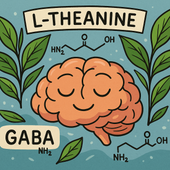
L-Theanine and GABA: Natural Calm for Parkinson’s-Related Anxiety
Anxiety in Parkinson’s often feels overwhelming — a constant inner tension that affects both body and mind. 🌿 This article explores how L-theanine and GABA, two natural compounds that promote relaxation without sedation, can help restore balance, ease restlessness, and calm the nervous system for a more peaceful state of mind. 🌙
-
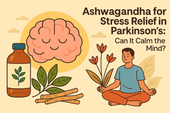
Ashwagandha for Stress Relief in Parkinson’s: Can It Calm the Mind?
Ashwagandha, the ancient Ayurvedic adaptogen, may offer powerful stress relief for people with Parkinson’s. 🌿 By regulating cortisol, calming the nervous system, and supporting dopamine balance, this natural herb helps ease anxiety, improve sleep, and promote emotional stability — restoring calm from the inside out. 🌙
-
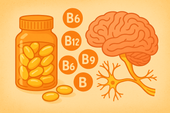
B Vitamins for Mood and Nerve Health in Parkinson’s Patients
B vitamins play a vital role in protecting the brain and nervous system in Parkinson’s. 🌿 From supporting dopamine production to reducing homocysteine and improving mood, these essential nutrients — especially B6, B9, and B12 — help stabilize emotions, boost energy, and preserve nerve integrity for better daily function and mental clarity. 💫
-
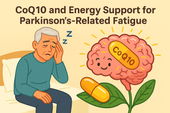
CoQ10 and Energy Support for Parkinson’s-Related Fatigue
Fatigue in Parkinson’s goes far beyond tiredness — it’s a deep cellular exhaustion. ⚡ CoQ10, a natural compound essential for energy production, may help restore vitality by supporting mitochondrial function and protecting brain cells from oxidative stress. Discover how CoQ10 can enhance energy, reduce fatigue, and improve overall resilience in Parkinson’s. 🌿
-
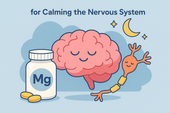
Magnesium for Calming the Nervous System in Parkinson’s
Magnesium is one of the most underrated allies for people with Parkinson’s. 🌿 This calming mineral supports the brain, relaxes tense muscles, and stabilizes the nervous system, helping reduce anxiety, restlessness, and sleep problems. Discover how magnesium nourishes dopamine pathways, protects neurons, and restores a sense of inner peace from within. 💫
-
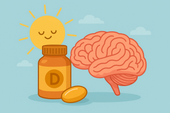
Vitamin D and Mental Health in Parkinson’s: Why Deficiency Matters
Vitamin D is more than a sunshine nutrient — it’s a key player in brain health and emotional balance for people with Parkinson’s. 🌞 This article explores how vitamin D influences dopamine, serotonin, and inflammation, and why deficiency can worsen depression, anxiety, and cognitive decline. Discover how restoring healthy levels can bring clarity, calm, and resilience back to daily life. 🌿
-

Omega-3s and Parkinson’s: Supporting Mood and Cognitive Clarity
Omega-3 fatty acids are among the most powerful nutrients for supporting brain health and emotional well-being in people with Parkinson’s. 🧠 This article explores how omega-3s strengthen neuronal membranes, improve dopamine and serotonin signaling, reduce inflammation, and promote cognitive clarity. Learn how these essential fats can help ease anxiety, lift mood, and protect your mind from oxidative stress naturally. 🌿
-
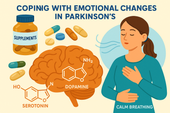
Coping with Emotional Changes in Parkinson’s: Supplements That Support Balance
Emotional changes like anxiety, depression, and irritability are common yet often overlooked symptoms of Parkinson’s disease. This article explores how supplements such as omega-3s, magnesium, and vitamin D can support mood regulation, while therapy and breathwork techniques help restore calm and emotional balance naturally. 🌿
-
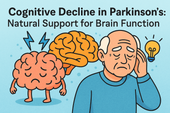
Cognitive Decline in Parkinson’s: Natural Support for Brain Function
Cognitive decline in Parkinson’s can affect memory, focus, and daily independence—but there’s hope. Understanding how the disease impacts brain chemistry opens the door to natural ways of support. From omega-3s and CoQ10 to mindfulness and exercise, you can nourish your brain, boost clarity, and slow decline through holistic care. 🌿🧠
-
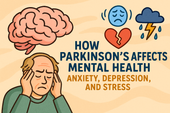
How Parkinson’s Affects Mental Health: Anxiety, Depression, and Stress
Dopamine is the brain’s spark of motivation—the chemical that fuels focus, pleasure, and drive. When dopamine levels are balanced, you feel inspired and alive; when they’re low, everything feels like an uphill climb. Understanding how dopamine works can help you support mental clarity, resilience, and emotional balance naturally. ⚡🧠
-
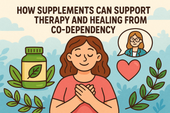
How Supplements Can Support Therapy and Healing from Co-Dependency
Biology is the science of life—an exploration of how cells, systems, and molecules create the foundation for every thought, emotion, and heartbeat. From the way our DNA shapes us to how hormones and neurons communicate, biology reveals the deep interconnectedness between mind and body. Understanding it helps us appreciate the delicate balance that keeps us alive, aware, and evolving. 🌿🧬
-
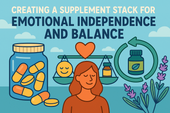
Creating a Supplement Stack for Emotional Independence and Balance
Biochemistry is the invisible language of life—how molecules, cells, and systems communicate to keep your body and mind in balance. From neurotransmitters shaping emotions to enzymes fueling energy, every process in your body reflects biochemical harmony. Understanding these reactions helps you see how nutrition, supplements, and emotions intertwine to support health, mood, and resilience. ⚗️🌿
-
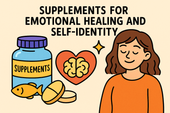
Supplements for Supporting Emotional Healing and Self-Identity
Biology is the bridge between mind and body—the science that explains how cells, hormones, and systems communicate to sustain life. It reveals how emotional states influence physical health, and how nourishment, rest, and movement keep us in balance. Understanding biology helps us reconnect with our natural intelligence and live in harmony with ourselves and the world. 🌿🔬
-
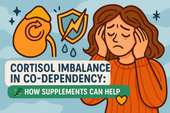
Cortisol Imbalance in Co-Dependency: How Supplements Can Help
Cortisol is the body’s main stress hormone—essential for energy and focus, yet harmful when chronically elevated. When life feels like constant pressure, cortisol imbalance can trigger fatigue, anxiety, and mood swings. Learning how to restore balance through rest, nutrition, and the right supplements can help you rebuild calm, clarity, and resilience from the inside out. 🌿💫
-
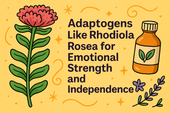
Adaptogens Like Rhodiola Rosea for Emotional Strength and Independence
Adaptogens are nature’s stress-balancing herbs—plants like Rhodiola, Ashwagandha, and Holy Basil that help your body adapt to emotional and physical pressure. They don’t numb or overstimulate; they teach your system how to find calm and stability again. By restoring balance to your hormones, energy, and mood, adaptogens nurture emotional resilience and grounded strength. 🌿✨
-
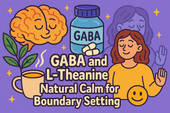
GABA and L-Theanine: Natural Calm for Boundary Setting
Anxiety can feel like a storm inside your mind—constant tension, overthinking, and the inability to relax even when you’re safe. But beneath the chaos, your body is simply trying to protect you. Learning to calm anxiety starts with understanding how your brain and nervous system respond to stress—and how to gently guide them back to peace. 🌿💫
-
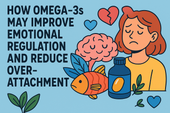
How Omega-3s May Improve Emotional Regulation and Reduce Over-Attachment
Inflammation isn’t just about sore joints or fatigue—it’s also a hidden driver of mood swings, anxiety, and emotional burnout. When chronic stress or poor diet keep the body inflamed, the brain’s chemistry changes, making calm harder to access. Learning how to reduce inflammation through nutrition, rest, and mindful living helps restore balance from the inside out. 🌿💫
-
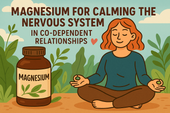
Magnesium for Calming the Nervous System in Co-Dependent Relationships
The nervous system is the body’s communication network, linking your mind and organs through a delicate web of electrical signals. It controls everything from emotional responses to muscle movement—and when it’s overwhelmed by chronic stress or anxiety, balance is lost. Learning how to calm and nourish your nervous system through nutrition, mindfulness, and rest can restore peace and emotional stability. 🌿💫
-
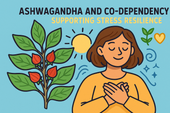
Ashwagandha and Co-Dependency: Supporting Stress Resilience
Stress is more than a feeling—it’s a full-body signal that your system is overwhelmed. When the mind races and the body tenses, your hormones, breathing, and focus all shift into survival mode. Chronic stress doesn’t just affect emotions—it reshapes your nervous system, drains your energy, and clouds your clarity. Learning to understand and manage stress gently is the first step toward peace, balance, and true recovery. 🌿💫
-

Why Co-Dependency Feels Draining: Adrenal Fatigue and Supplements That Help
The adrenal glands are small but powerful organs that sit above your kidneys, acting as your body’s built-in stress managers. They produce hormones like cortisol and adrenaline that help regulate energy, mood, and resilience. When they’re overworked from chronic stress or emotional exhaustion, fatigue and imbalance follow. Supporting adrenal health naturally can help restore calm, energy, and hormonal balance. 🌿⚡
-

The Link Between Anxiety, Co-Dependency, and Natural Support
Anxiety feels like living in constant alert mode—your heart races, your thoughts loop, and your body can’t find peace. It’s the nervous system’s way of preparing for danger, even when none exists. Understanding what’s happening in your mind and body is the first step toward calming the storm and restoring balance. 🌿💫
-

Supplements That Support Dopamine and Serotonin in Co-Dependent Patterns
Serotonin is the neurotransmitter of calm, confidence, and contentment. When it’s balanced, you feel peaceful and emotionally grounded. When it’s low, anxiety, mood swings, and emotional dependence take over. By understanding serotonin’s role in emotional health—and how to support it naturally—you can rebuild inner stability, improve relationships, and cultivate lasting happiness from within. 🌞💫
-

How Emotional Exhaustion in Codependency Impacts the Nervous System
The nervous system is the body’s communication network, connecting the brain to every organ and muscle. It regulates stress, mood, and emotion through a delicate balance of electrical and chemical signals. When overwhelmed, it can become dysregulated—leading to fatigue, anxiety, and emotional imbalance. Understanding how to calm and strengthen the nervous system is key to healing from chronic stress and emotional burnout. ⚡🌿
-

What Is Co-Dependency? The Role of Brain Chemistry and Stress
Stress is more than a feeling—it’s a full-body experience that begins in the brain and ripples through every cell. When cortisol surges and the nervous system stays on alert, your body can’t rest or recover. Over time, this constant tension affects energy, focus, mood, and even immune health. Understanding stress chemistry is the first step toward breaking free from burnout and finding calm again. 🌿
-

Creating a Supplement Stack for Motivation, Energy, and Anti-Procrastination
Motivation is the fuel behind every meaningful achievement—but it’s not just about willpower. It’s a mix of mindset, brain chemistry, and momentum. When energy, focus, and purpose align, action feels natural instead of forced. Learn how to harness motivation as a daily state, not a fleeting feeling.
-

Supplements for Building Consistency and Reducing Chronic Procrastination
Biochemistry is the bridge between biology and chemistry—the science of life at the molecular level. It explains how nutrients, hormones, and neurotransmitters interact to create energy, thought, and emotion. From brain function to muscle movement, biochemistry reveals the invisible processes that sustain health, balance, and vitality.
-

GABA and Procrastination: Supporting Calm Focus for Productivity
GABA is the brain’s natural calming messenger—a neurotransmitter that helps slow mental overactivity and ease stress. When GABA levels drop, focus fades, anxiety rises, and procrastination becomes more likely. By supporting GABA through nutrition, lifestyle, and supplements, you can restore calm clarity, improve focus, and take action with steady, balanced energy.
-

Ashwagandha and Procrastination: Lowering Stress to Improve Action
Science is the language of curiosity and discovery. It helps us understand the hidden patterns behind life, energy, and the universe. Through experimentation and critical thinking, science connects imagination to evidence—turning questions into knowledge. Whether through microscopes, molecules, or minds at work, science represents our endless pursuit of truth and innovation.
-

Neurotransmitters and Motivation: Supplements That Support Drive and Focus
Supplements can do more than boost physical health—they can also enhance mental clarity, focus, and motivation. Nutrients like omega-3s, magnesium, B vitamins, and adaptogens help balance neurotransmitters, stabilize mood, and support brain energy. When combined with good sleep, nutrition, and mindful habits, they can transform how your brain performs under stress.
-

How Stress Hormones Like Cortisol Fuel Procrastination (and What Helps)
Blood sugar isn’t just about physical health—it directly impacts focus, mood, and motivation. When glucose levels spike and crash, energy and attention do the same, fueling procrastination and brain fog. Learning how to stabilize blood sugar through balanced meals, mindful habits, and key nutrients helps keep your mind steady, focused, and ready to act.
-

Brain Fog and Procrastination: Supplements for Mental Clarity
Brain fog can turn even simple tasks into mental hurdles. When your thoughts feel slow and unclear, procrastination often follows—making focus and productivity seem impossible. This article explores the biochemical and lifestyle causes of brain fog and reveals the most effective supplements for restoring mental clarity, focus, and sustained energy.
-

The Link Between Low Energy and Procrastination: Can Supplements Help?
Neurochemistry shapes how we think, feel, and act. When neurotransmitters like dopamine, serotonin, and GABA fall out of balance, it can lead to fatigue, anxiety, or lack of motivation—fueling procrastination and low mood. Understanding the brain’s chemical communication system helps us find ways to restore focus, calm, and emotional stability through nutrition, mindfulness, and targeted supplements.
-

Why Do We Procrastinate? The Role of Dopamine and Supplements That Support It
Dopamine is the brain’s motivation messenger—the chemical that fuels focus, reward, and drive. When dopamine levels drop, even simple tasks can feel impossible to start. This article explores how dopamine shapes procrastination, motivation, and mental energy, along with natural supplements and daily habits that help restore balance and get things done.
-

Phosphatidylserine and Stress Reduction for People with BDD
Stress is more than a mental state—it’s a full-body experience that affects hormones, brain chemistry, and emotional balance. For people with Body Dysmorphic Disorder (BDD), constant tension and worry about appearance can overload the nervous system. Learning how stress works and finding ways to calm it is key to breaking the cycle of anxiety and self-criticism.
-

How Antioxidants Like Vitamin C & E Support Mental Health in BDD
Antioxidants are the body’s natural defense against stress and inflammation. For people with Body Dysmorphic Disorder (BDD), oxidative stress can worsen fatigue, anxiety, and emotional imbalance. Nutrients like Vitamin C and E help protect brain cells, boost neurotransmitter function, and support a calmer, clearer mindset—building a stronger foundation for recovery.
-

Ginkgo Biloba and Memory Support for BDD Recovery
Emotional regulation is the foundation of healing from Body Dysmorphic Disorder (BDD). When the nervous system stays in constant overdrive, even small stressors can trigger self-critical spirals. Learning to calm emotional reactivity helps restore clarity, confidence, and a sense of inner balance. By blending mindfulness, nervous system support, and self-compassion, you can retrain your brain to respond—not react—to emotion.
-

Alpha GPC and Cognitive Function in Body Dysmorphic Disorder
Mental fatigue can feel like your brain has hit a wall—thoughts slow down, focus fades, and motivation disappears. For people with Body Dysmorphic Disorder (BDD), chronic overthinking, emotional stress, and constant self-evaluation can deplete mental energy even further. Understanding what causes this cognitive exhaustion is the first step toward recovery—through rest, balanced nutrition, and targeted brain-supporting supplements.
-

N-Acetyl L-Tyrosine and BDD: Supporting Mental Clarity
Chronic stress doesn’t just affect your mood—it reshapes your brain chemistry, weakens focus, and fuels the obsessive thought loops common in Body Dysmorphic Disorder (BDD). Over time, constant cortisol elevation drains mental energy and emotional balance. Learning to recognize and manage chronic stress is essential to restoring mental clarity, self-compassion, and resilience.
-

Chamomile and Lavender for Calming Obsessive Body Image Thoughts
The nervous system is the command center of our emotional and physical world—and in Body Dysmorphic Disorder (BDD), it often operates in overdrive. Understanding how the brain and body communicate under stress reveals why intrusive thoughts feel uncontrollable. Learning to regulate the nervous system through calm practices, nutrition, and supplements helps restore inner balance and emotional safety.
-

Adaptogens for Body Dysmorphic Disorder: Rhodiola, Ginseng, and More
Rhodiola rosea, often called the “golden root,” is an adaptogenic herb renowned for boosting stress resilience and mental endurance. For individuals with Body Dysmorphic Disorder (BDD), Rhodiola may help reduce fatigue, regulate cortisol, and enhance emotional balance. By supporting both mind and body, this powerful plant promotes calm focus, improved mood, and renewed energy to face daily challenges.
-

B Vitamins for Stress Resilience in BDD: Rebuilding Calm from Within
Biochemistry is at the heart of every thought, emotion, and reaction we experience. In Body Dysmorphic Disorder (BDD), chemical imbalances in neurotransmitters like serotonin, dopamine, and GABA can amplify stress and distort self-perception. Understanding the biochemistry behind mood and stress regulation offers a path toward healing—bridging the gap between emotional experience and the body’s molecular balance.
-

Melatonin and Body Dysmorphic Disorder: Restoring Healthy Sleep Patterns
Melatonin, the body’s natural sleep hormone, plays a vital role in helping people with Body Dysmorphic Disorder (BDD) restore healthy sleep cycles. When anxiety and obsessive thinking interfere with rest, melatonin levels often drop, leading to more emotional reactivity and distorted self-perception. This article explores how melatonin works, why BDD disrupts it, and how natural supplementation—combined with mindful routines—can help the brain and body finally find calm at night.
-

Sleep Struggles with BDD: Supplements for Rest and Recovery
When you’re living with Body Dysmorphic Disorder (BDD), restful sleep can feel impossible—but the right supplements can help reset your body’s natural rhythm. From magnesium and L-theanine to 5-HTP and ashwagandha, these nutrients support relaxation, lower cortisol, and enhance melatonin production. This article explores how supplements can calm the mind, ease nighttime anxiety, and promote true restorative sleep for emotional and physical recovery.
-

5-HTP and Serotonin Balance: Could It Help with Body Dysmorphic Disorder?
Anxiety can feel like a storm inside the mind—restless, overwhelming, and hard to control. In people with Body Dysmorphic Disorder (BDD), anxiety often fuels obsessive thoughts and self-criticism, creating a painful cycle of worry and self-doubt. This article explores the biological roots of anxiety, the role of neurotransmitters like serotonin and GABA, and how natural strategies such as mindfulness, supplements, and nervous system regulation can restore calm and mental clarity.
-

Can Ashwagandha Help Ease Stress and Anxiety in Body Dysmorphic Disorder?
Neurotransmitters like serotonin, dopamine, GABA, and acetylcholine are the chemical messengers that shape how we think, feel, and react to stress. In Body Dysmorphic Disorder (BDD), imbalances in these neurotransmitters can amplify anxiety, obsessive thinking, and emotional distress. This article explores how restoring healthy brain chemistry through nutrition, supplements, and mindfulness can help bring clarity, calm, and emotional stability.
-

L-Theanine for BDD: Finding Calm in the Mind
Neurochemistry plays a central role in how we think, feel, and see ourselves. For those living with Body Dysmorphic Disorder (BDD), imbalances in neurotransmitters like serotonin, dopamine, and GABA can intensify anxiety, obsessive thoughts, and emotional distress. This article explores how regulating brain chemistry through supplements, mindfulness, and lifestyle changes can bring the nervous system back into harmony and restore inner calm.
-

Omega-3 Fatty Acids and Body Image Disorders: Supporting Emotional Health
Omega-3 fatty acids do far more than support heart health—they nourish the brain, stabilize mood, and may ease the emotional turbulence tied to body image disorders like BDD. This in-depth article explores how omega-3s regulate serotonin, dopamine, and inflammation, helping individuals reduce obsessive thoughts and rebuild self-acceptance. It also connects nutrition to therapy, mindfulness, and nervous system balance for holistic emotional healing.
-

Magnesium and BDD: Calming an Overactive Nervous System
Magnesium plays a crucial role in calming an overactive nervous system—something people with Body Dysmorphic Disorder (BDD) struggle with daily. This article explores how magnesium supports relaxation, emotional regulation, and stress reduction while diving into the science behind its connection to brain chemistry. It also examines how combining magnesium supplementation with therapy and breathwork can help rebalance the body’s stress response, reduce obsessive thought patterns, and promote lasting nervous system calm.
-

The Gut-Brain Axis and BDD: Why Probiotics Might Matter
The gut and brain are constantly in conversation — and that dialogue may shape how you experience Body Dysmorphic Disorder. By nurturing your microbiome with probiotics, prebiotics, and gut-healing nutrients, you can help rebalance serotonin, calm anxiety, and restore emotional stability from within 🧠🦠.

















































